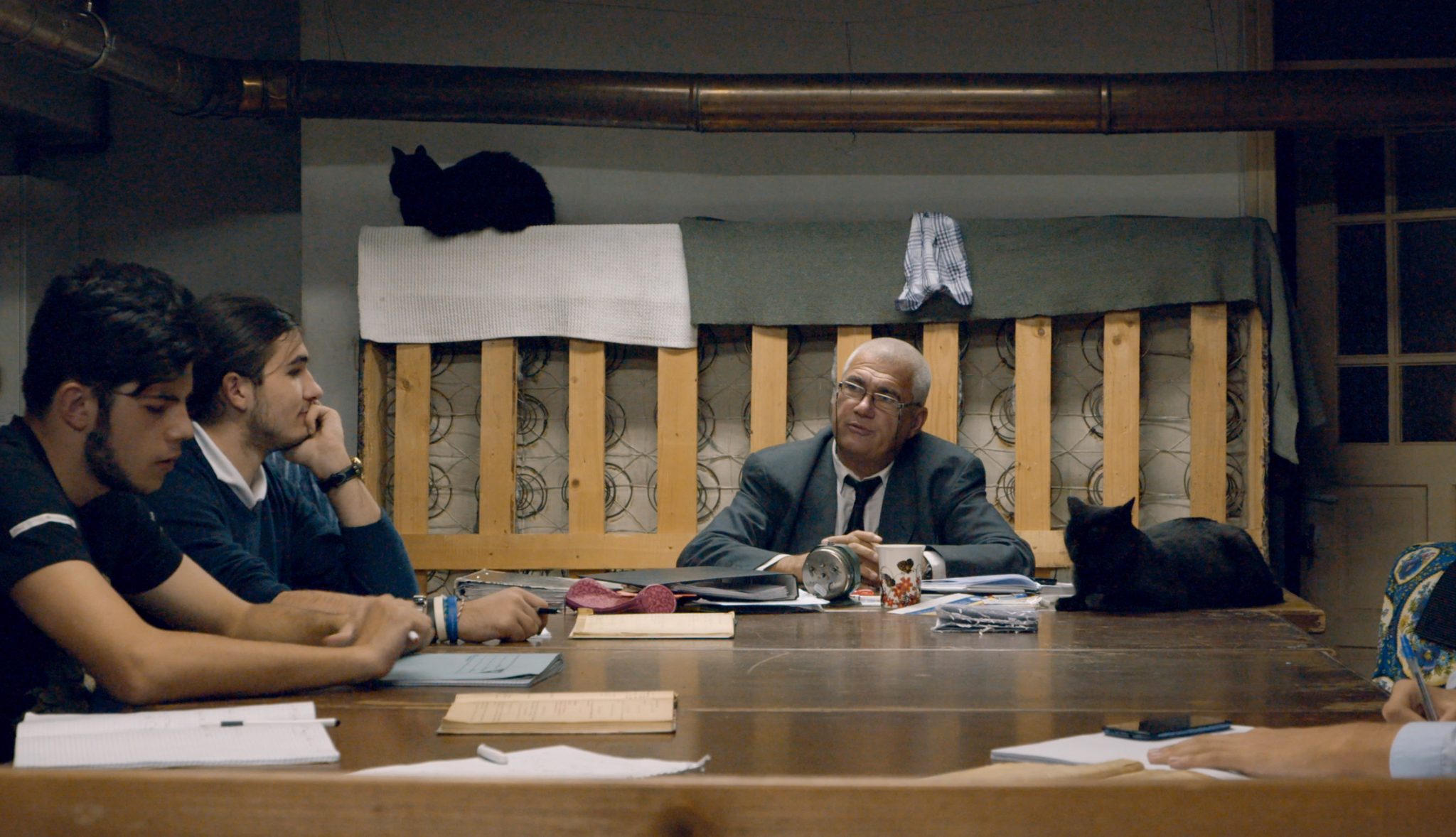Teach – A different kind of school
The history of cinema, and especially that of documentary cinema, contains a wealth of singular figures, of exceptional individuals, of people that are different. Even so, to burden a film such as Teach/Profu’ by asking “so, what’s new in all this?” would mean to look in the wrong direction – and that is because the film has the candor of placing total faith in its protagonist and to exclusively set itself within the borders of his aura as if it would pioneer something that is instantly precious, never-before-seen and thus unmissable. That’s both good and bad at the same time. Well, it’s good news for cinema, because it features a person who is given an ample degree of exposure, being accompanied for a long period of time, in a fashion that is generous with durations. It’s bad news because an unconventional individual will never comfortably fit into a conventional film, that does nothing more than to dull his rougher sides and contradictions through its usage as a highly pre-packaged form.
This is Teach: an unassuming portrait of a person that wanted to do things in his own way. Sick and tired of the gibberish floating in the Romanian educational system, Dorin Ionita decides to give up his institutional teaching career, only to put together a mathematical laboratory in his cramped apartment, thus continuing his pedagogical vocation while changing its rules. Students of all ages and all levels of expertise meet up at his long table, and teach’ guides them all, true to his “spiritual” and playful demeanor. It’s a convivial space, where everyone speaks informally and doesn’t shy away from cussing, where puns are served by the professor and shot back by the students like in a tennis match, where school is turned inside out and enriched with anecdotes, advice, and guiding principles. Ionita is (and permanently wishes to be) more than a teacher: by citing Noica, he aspires to push the buttons that lie deep beneath the surface of his pupils, in order to bring them onto his way. At one point, a former pupil, who is now a Ph.D. candidate, visits the teacher. A nostalgic dialogue takes place, in which the young man asks himself how come their relationship managed to reach such heights. Teach’, as usual, is the one that holds the key to the mystery: it’s because, as he himself claims, he brought the young man’s entire entourage to study in his home, and thus gained access to lesser-known spiritual paths, which are usually denied to “mentors”.

A documentary that regards a seemingly remarkable personality is all the more brilliant, to the degree that it manages to persuade us that this is the way things truly are; that through the screen we have discovered an individual that the entire world must find out about. It’s a sensation – or, if you will, a natural confirmation of the contact between director and spectator – that I had to search for intensively until I managed to find it towards the end. That is because the film doesn’t seem to unequivocally dispel the question that, ultimately, it could have well dedicated itself to another person; that, beyond director Alex Brendea’s subjective nostalgia for an outstanding teacher from his high school days, there’s not much in terms of unshakeable justifications for this portrait; that the originality of this character might be slightly overplayed (and how many pure-hearted people don’t end up being disgusted at the System?). It’s as if the documentary would go out of its way to tell us, in every imaginable way, to “look at this fabulous human being”, but all that we see are some tutorship sessions which are held in an extended formula, in which ideas are not always flying high, and mathematics ends up as a metaphorical crutch in a series of cheesy cautionary tales. To add salt to the injury, the script insufficiently insists on Ionita’s existential contradiction, one that he himself brings into the discussion: it’s exactly due to a faulty educational system that he can go about his activities in a semi-clandestine scheme. Now that is a topic that deserves more ample scrutiny. Because we don’t find out much about the “concrete” part of this machinery (meaning the cost and duration of these meetings). The à la Păltiniș character of these meetings must be taken with a grain of salt, since, first and foremost, the times have changed.
That being said, the film does have its moments – and it’s generally exactly those moments in which we are privy to “closed circles”, in which students that are just about to pass their Baccalaureate exams or his former graduates, who have meanwhile seen the world at large, return to the teacher’s house. There is a palpable emotion in these scenes, which is probably due in part to the fact that power relations dissipate completely in such moments, probably because the façade of the person that readily stands in front of the camera slides away, and the film finally manages to capture what takes place between a couple of people that present themselves without wearing their armors. The film’s observational pretenses are fully justified in these passages: we see things that mustn’t be interrupted or influenced under any circumstances. These scenes offer the depth that is otherwise lacking throughout these long meetings, which extend in a now-lonely house during the holiday season when the work is finally done. When teach’ is all alone and is reading a dedication from a former student in his doctoral thesis, over and over again, we finally realize that he is, in fact, not alone: we are also there with him.
Profu’/Teach’ will be released in Romanian cinemas starting with the 2nd of October.
Film critic and journalist; writes regularly for Dilema Veche and Scena9. Doing a MA film theory programme in Paris.


